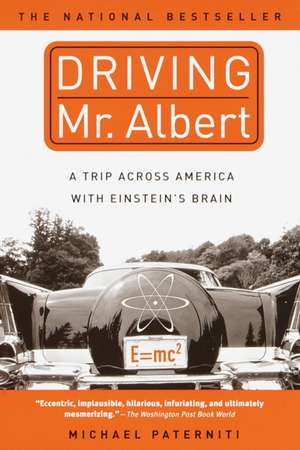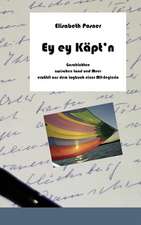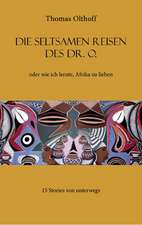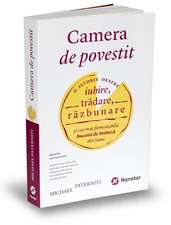Driving Mr. Albert: A Trip Across America with Einstein's Brain
Autor Michael Paternitien Limba Engleză Paperback – 31 mai 2001
Vezi toate premiile Carte premiată
On a cold February day, the two men and the brain leave New Jersey and light out on I-70 for sunny California, where Einstein's perplexed granddaughter, Evelyn, awaits. And riding along as the imaginary fourth passenger is Einstein himself, an id-driven genius, the original galactic slacker with his head in the stars. Part travelogue, part memoir, part history, part biography, and part meditation, Driving Mr. Albert is one of the most unique road trips in modern literature.
Preț: 114.06 lei
Nou
Puncte Express: 171
Preț estimativ în valută:
21.82€ • 22.85$ • 18.06£
21.82€ • 22.85$ • 18.06£
Carte disponibilă
Livrare economică 17-31 martie
Preluare comenzi: 021 569.72.76
Specificații
ISBN-13: 9780385333030
ISBN-10: 038533303X
Pagini: 224
Dimensiuni: 140 x 208 x 18 mm
Greutate: 0.28 kg
Editura: Dial Press
ISBN-10: 038533303X
Pagini: 224
Dimensiuni: 140 x 208 x 18 mm
Greutate: 0.28 kg
Editura: Dial Press
Notă biografică
Michael Paterniti won the 1998 National Magazine Award for his article "Driving Mr. Albert," which was first published in Harper's Magazine. A former executive editor of Outside, his work has appeared in Rolling Stone, The New York Times Magazine, Details, and Esquire, where he is writer-at-large. He lives in Portland, Maine, with his wife and son.
Extras
On a cold winter day, during one of my early visits to Dr. Harvey, we drove around Princeton, making the obligatory pilgrimage to 112 Mercer Street, the house where Einstein spent the last twenty years of his life. We sat for awhile with the car running, warm air pouring from the heater, gazing at a modest wood-frame colonial with black shutters on a pleasant block of like houses. More than anything, Einstein said he loved the old place for the light that filled the upstairs rooms and for the gardens out back. He kept pictures of Michaelangelo and Schopenhauer hanging in his study, because, as he said, both men had escaped an everyday life of raw monotony and taken "refuge in a world crowded with images of our own creation."
Sitting in the car, Thomas Harvey recalled hoew the Einstein family gathered here after the scientist's death, how his son, Hans Albert, and Einstein's longtime assistant, Helen Dukas, and Einstein's executor, Otto Nathan, as well as a small group of intimates, drove to a secret spot along the Delaware and scattered the ashes that remained of Albert Einstein's body, And that was it.
Not surprsingly, however, controversy immediately enshrouded the removal of Einstein's brain. Word was leaked by Harvey's former teacher Dr. Zimmerman that Harvey had Einstein's brain, and that he, Zimmerman, was expecting to receive it from his student. When this was reported in The New York Times a day after Einstein's death, Hans Albert, who knew nothing of his father's brain having been removed, was flabbergasted. Otto Nathan expressed regret and shock, and later implied that Harvey was a bald-faced thief. But, according to Harvey, Nathan, who died in 1984, stood by the door of the morgue, watching the entire autopsy. (Nathan would later claim he didn't know what Harvey was up to.)
Meanwhile, Harvey announced in a press conference that he was planning to conduct medical research on the brain. He says he spoke to Hans Albert over the phone, assuring him the brain would be studied for its scientific value, which would then be reported in a medical journal, thus allaying one of the deepest fears of the Einstein family: that the brain would becom a pop-cultural gewgaw. "My one regret is that I didn't come to Mercer Street and talk to Hans Albert in person," Harvey told me that day. "You know, clear things up before it got out of hand."
But things were already out of hand. Zimmerman, then on staff at New York's Montefiore Medical Center, prepared for the delivery of Einstein's brain, but it never arrived. Increasingly flummoxed, then angry and embarrassed, Zimmerman found out that Princeton Hospital, under the direction of a man named John Kauffman, had decided not to relinquish it. "Hospitals Tiff over Brain of Einstein," read one 1955 headline, and went on to describe how the brain remained at "the center of a jurisdictional dispute," with Princeton Hospital standing its ground, like an old-time gunfighter, claiming "the brain wouldn't be taken out of town."
But then, a few years after the autopsy, Harvey was fired from his job for allegedly refusing to give up Einstein's brain to Kauffman. In fact, Harvey had kept the brain himself, not at the hospital, but at home, and when he left Princeton he simply took it with him. Years passed. There were no studies or findings. And, in turn, no legal action was brought against Harvey, as there was no precedence in the courts for the recovery of a brain under such circumstances. And then Harvey fell off the radar screen. When he gave an occasional interview -- in local newspaper articles from 1956 and 1979 and 1988 -- he always repeated that he was about "a year from finishing study on the specimen."
Four decades later, there's still no study. And because somewhere in his watery blue eyes, his genial stumble-footing, and that ineffable cloak of hunched integrity that falls over the old, I find myself feeling for him and can't bring myself to ask the essential questions: Is he a grave-robbing thief or a renegade? A sham or a shaman?
Sitting in the car, Thomas Harvey recalled hoew the Einstein family gathered here after the scientist's death, how his son, Hans Albert, and Einstein's longtime assistant, Helen Dukas, and Einstein's executor, Otto Nathan, as well as a small group of intimates, drove to a secret spot along the Delaware and scattered the ashes that remained of Albert Einstein's body, And that was it.
Not surprsingly, however, controversy immediately enshrouded the removal of Einstein's brain. Word was leaked by Harvey's former teacher Dr. Zimmerman that Harvey had Einstein's brain, and that he, Zimmerman, was expecting to receive it from his student. When this was reported in The New York Times a day after Einstein's death, Hans Albert, who knew nothing of his father's brain having been removed, was flabbergasted. Otto Nathan expressed regret and shock, and later implied that Harvey was a bald-faced thief. But, according to Harvey, Nathan, who died in 1984, stood by the door of the morgue, watching the entire autopsy. (Nathan would later claim he didn't know what Harvey was up to.)
Meanwhile, Harvey announced in a press conference that he was planning to conduct medical research on the brain. He says he spoke to Hans Albert over the phone, assuring him the brain would be studied for its scientific value, which would then be reported in a medical journal, thus allaying one of the deepest fears of the Einstein family: that the brain would becom a pop-cultural gewgaw. "My one regret is that I didn't come to Mercer Street and talk to Hans Albert in person," Harvey told me that day. "You know, clear things up before it got out of hand."
But things were already out of hand. Zimmerman, then on staff at New York's Montefiore Medical Center, prepared for the delivery of Einstein's brain, but it never arrived. Increasingly flummoxed, then angry and embarrassed, Zimmerman found out that Princeton Hospital, under the direction of a man named John Kauffman, had decided not to relinquish it. "Hospitals Tiff over Brain of Einstein," read one 1955 headline, and went on to describe how the brain remained at "the center of a jurisdictional dispute," with Princeton Hospital standing its ground, like an old-time gunfighter, claiming "the brain wouldn't be taken out of town."
But then, a few years after the autopsy, Harvey was fired from his job for allegedly refusing to give up Einstein's brain to Kauffman. In fact, Harvey had kept the brain himself, not at the hospital, but at home, and when he left Princeton he simply took it with him. Years passed. There were no studies or findings. And, in turn, no legal action was brought against Harvey, as there was no precedence in the courts for the recovery of a brain under such circumstances. And then Harvey fell off the radar screen. When he gave an occasional interview -- in local newspaper articles from 1956 and 1979 and 1988 -- he always repeated that he was about "a year from finishing study on the specimen."
Four decades later, there's still no study. And because somewhere in his watery blue eyes, his genial stumble-footing, and that ineffable cloak of hunched integrity that falls over the old, I find myself feeling for him and can't bring myself to ask the essential questions: Is he a grave-robbing thief or a renegade? A sham or a shaman?
Recenzii
"Eccentric, implausible, hilarious, infuriating, and ultimately mesmerizing."
-- The Washington Post Book World
"A splendid peek into the weird side of American life. Driving Mr. Albert is a work of ... uncommon intelligence."
-- Newsweek
"One of the most fascinating and memorable road trips since Kerouac's On the Road."
-- The Denver Post
"Driving Mr. Albert is entertaining, absurd, real, deep and informative ... in a world in which it seems that all the good ideas have been taken, it is singular."
-- The Boston Globe
"Paterniti seems to have been favored by that happy little god of travel writers who sits on one shoulder and whispers ... the perfect anecdotes, the perfect set pieces at the perfect moments. ... It's a brain, in fact, that I'd be happy to travel with again."
-- The New York Times Book Review
-- The Washington Post Book World
"A splendid peek into the weird side of American life. Driving Mr. Albert is a work of ... uncommon intelligence."
-- Newsweek
"One of the most fascinating and memorable road trips since Kerouac's On the Road."
-- The Denver Post
"Driving Mr. Albert is entertaining, absurd, real, deep and informative ... in a world in which it seems that all the good ideas have been taken, it is singular."
-- The Boston Globe
"Paterniti seems to have been favored by that happy little god of travel writers who sits on one shoulder and whispers ... the perfect anecdotes, the perfect set pieces at the perfect moments. ... It's a brain, in fact, that I'd be happy to travel with again."
-- The New York Times Book Review
Descriere
Albert Einstein's brain floats in a Tupperware bowl in the trunk of a Buick Skylark barreling across America. Driving the car is journalist Michael Paterniti, next to him is the 84-year-old pathologist who performed the autopsy on Einstein in 1955 and kept the brain as a souvenir. A road story with a cerebral twist.
Premii
- Book Sense Book of the Year Award Nominee, 2001



















